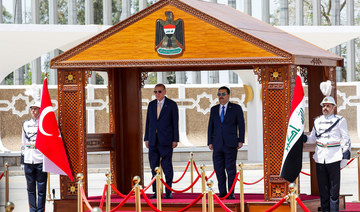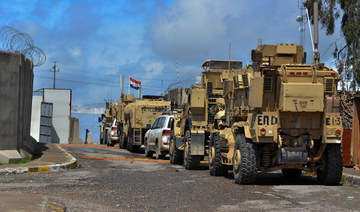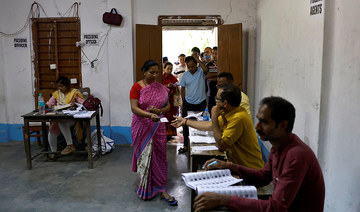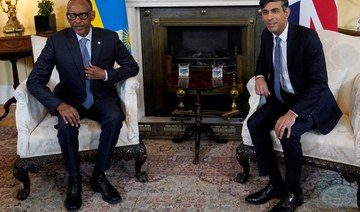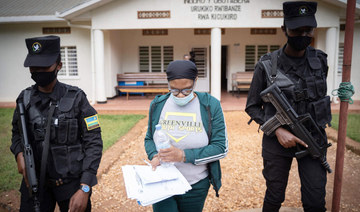NEW YORK: Flinching when he heard himself described as a man who used power to prey on women, Harvey Weinstein was arraigned Friday on rape and other charges in the first criminal prosecution to result from the wave of allegations against him that sparked a national reckoning over sexual misconduct.
Seven months after the allegations destroyed his career and catalyzed the #MeToo movement, the once-powerhouse movie producer turned himself in to face the charges, which stem from encounters with two of the dozens who have accused him of sexual misdeeds ranging from harassment to assault.
“This defendant used his position, money and power to lure young women into situations where he was able to violate them sexually,” Manhattan Assistant Attorney Joan Illuzzi-Orbon said in court. Weinstein raised his eyebrows as he heard it.
Weinstein has consistently denied any allegations of nonconsensual sex. His lawyer, Benjamin Brafman, didn’t elaborate further on the denials Friday, saying he wasn’t there “to try the case” at this point.
A judge agreed to release Weinstein on $1 million bail, with constant electronic monitoring and a ban on traveling beyond New York and Connecticut.
A make-or-break Hollywood producer until the allegations destroyed his career last fall, Weinstein, 66, found himself surrounded by lights and cameras in a spectacle he couldn’t control.
“You sorry, Harvey?” came a shout from a throng of media as the once powerful movie mogul walked into a lower Manhattan courthouse in handcuffs, his head bowed. Asked “What can you say?” he mildly shook his head and softly said “No.”
Weinstein was charged with rape and a criminal sex act as well as lower-level sex abuse and sexual misconduct charges.
Weinstein lumbered into a police station early Friday wearing a blazer and carrying books including “Something Wonderful: Rodgers and Hammerstein’s Broadway Revolution,” about the Broadway musical duo of Richard Rodgers and Oscar Hammerstein II, and “Elia Kazan,” about the famed film director,
A law enforcement official told The Associated Press that the criminal sex act charge stems from a 2004 encounter between Weinstein and Lucia Evans, a then-aspiring actress who has said the Hollywood mogul forced her to perform oral sex on him in his office. She was among the first women to speak out about the producer.
The rape charge relates to a woman who was not identified. A court complaint says Weinstein raped her in a Manhattan hotel in 2013.
Brafman has previously said that Weinstein has consistently denied any allegations of “nonconsensual sex.”
Evans confirmed to The New Yorker that she was pressing charges.
“At a certain point, you have to think about the greater good of humanity, of womankind,” she told the magazine.
Evans told The New Yorker in a story published in October that Weinstein forced her to perform oral sex during a daytime meeting at his New York office in 2004, the summer before her senior year at Middlebury College.
“I said, over and over, ‘I don’t want to do this, stop, don’t,’” she told the magazine. “I tried to get away, but maybe I didn’t try hard enough. I didn’t want to kick him or fight him.”
Manhattan District Attorney Cyrus Vance had been under enormous public pressure to bring a criminal case against Weinstein. Some women’s groups, including the Hollywood activist group Time’s Up, accused the Democrat of being too deferential to Weinstein and too dismissive of his accusers.
A grand jury has been hearing evidence in the case for weeks.
In March, New York Gov. Andrew Cuomo took the extraordinary step of ordering the state’s attorney general to investigate whether Vance acted properly in 2015 when he decided not to prosecute Weinstein over a previous allegation of unwanted groping, made by an Italian model. That investigation is in its preliminary stages.
More than 75 women have accused Weinstein of wrongdoing around the globe. Several actresses and models accused him of criminal sexual assaults, but many of the encounters happened too long ago for any prosecution. Film actress Rose McGowan said Weinstein raped her in 1997 in Utah, “Sopranos” actress Annabella Sciorra said he raped her in her New York apartment in 1992 and Norwegian actress Natassia Malthe said he attacked her in a London hotel room in 2008.
McGowan told the AP on Thursday that “the justice system has been something very elusive.”
“I hope in this case, it works. Because it’s all true. None of this was consensual,” she said.
The statute of limitations for rape and certain other sex crimes in New York was eliminated in 2006, but not for attacks that happened prior to 2001.
New York City police detectives said in early November that they were investigating allegations by another accuser, “Boardwalk Empire” actress Paz de la Huerta, who told police in October that Weinstein raped her twice in 2010. She is not one of the victims in the case on Friday; hers was still pending, officials said.
Authorities in California and London also are investigating assault allegations. Britain has no statute of limits on rape cases; some of the allegations under investigation there date to the 1980s.
Harvey and his brother Bob Weinstein started his now-bankrupt company after leaving Miramax, the company they founded in 1979 and which became a powerhouse in ‘90s indie film with hits like “Pulp Fiction” and “Shakespeare in Love.” The Weinstein Co. found success with Oscar winners “The Artist” and “The King’s Speech.”
Harvey Weinstein charged with rape
Harvey Weinstein charged with rape

- Seven months after allegations of sexual misconduct destroyed his career and catalyzed the #MeToo movement, the once-powerhouse movie producer turned himself in to face charges.
- Manhattan Assistant Attorney Joan Illuzzi-Orbon: “This defendant used his position, money and power to lure young women into situations where he was able to violate them sexually.”
Asia hit hardest by climate, weather disasters in 2023:UN
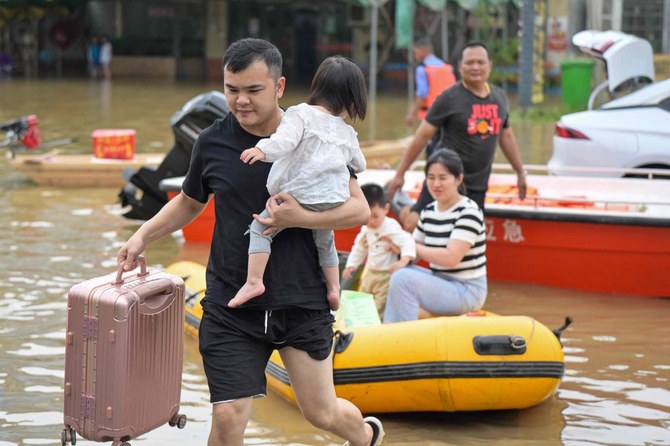
Global temperatures hit record highs last year, and the UN’s weather and climate agency said Asia was warming at a particularly rapid pace.
The World Meteorological Organization said the impact of heatwaves in Asia was becoming more severe, with melting glaciers threatening the region’s future water security.
The WMO said Asia was warming faster than the global average, with temperatures last year nearly two degrees Celsius above the 1961 to 1990 average.
“The report’s conclusions are sobering,” WMO chief Celeste Saulo said in a statement.
“Many countries in the region experienced their hottest year on record in 2023, along with a barrage of extreme conditions, from droughts and heatwaves to floods and storms.
“Climate change exacerbated the frequency and severity of such events, profoundly impacting societies, economies, and, most importantly, human lives and the environment that we live in.”
The State of the Climate in Asia 2023 report highlighted the accelerating rate of key climate change indicators such as surface temperature, glacier retreat and sea level rise, saying they would have serious repercussions for societies, economies and ecosystems in the region.
“Asia remained the world’s most disaster-hit region from weather, climate and water-related hazards in 2023,” the WMO said.
The annual mean near-surface temperature over Asia in 2023 was the second highest on record, at 0.91 degrees Celsius above the 1991-2020 average, and 1.87 C above the 1961-1990 average.
Particularly high average temperatures were recorded from western Siberia to central Asia, and from eastern China to Japan, the report said, with Japan having its hottest summer on record.
As for precipitation, it was below normal in the Himalayas and in the Hindu Kush mountain range in Pakistan and Afghanistan.
Meanwhile southwest China suffered from a drought, with below-normal precipitation levels in nearly every month of the year.
The High-Mountain Asia region, centered on the Tibetan Plateau, contains the largest volume of ice outside of the polar regions.
Over the last several decades, most of these glaciers have been retreating, and at an accelerating rate, the WMO said, with 20 out of 22 monitored glaciers in the region showing continued mass loss last year.
The report said 2023 sea-surface temperatures in the northwest Pacific Ocean were the highest on record.
Last year, 79 disasters associated with water-related weather hazards were reported in Asia. Of those, more than 80 percent were floods and storms, with more than 2,000 deaths and nine million people directly affected.
“Floods were the leading cause of death in reported events in 2023 by a substantial margin,” the WMO said, noting the continuing high level of vulnerability of Asia to natural hazard events.
Hong Kong recorded 158.1 millimeters of rainfall in one hour on September 7 — the highest since records began in 1884, as a result of a typhoon.
The WMO said there was an urgent need for national weather services across the region to improve tailored information to officials working on reducing disaster risks.
“It is imperative that our actions and strategies mirror the urgency of these times,” said Saulo.
“Reducing greenhouse gas emissions and adapting to the evolving climate is not merely an option, but a fundamental necessity.”
Jury deliberating in Iraq Abu Ghraib prison abuse civil case; contractor casts blame on Army
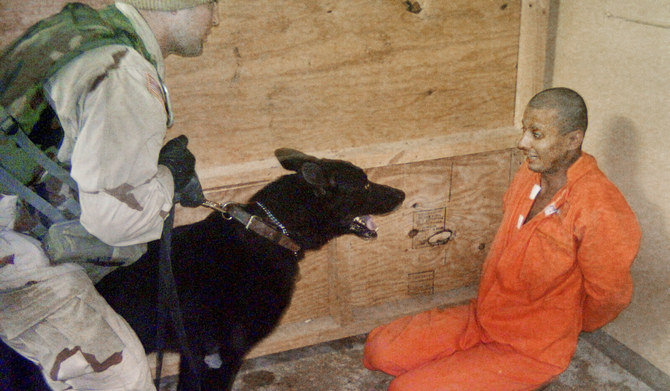
- Raisi said the killings by Israel in Gaza were being committed with the support of the United States and other Western countries
ALEXANDRIA, Virginia: A lawyer for the military contractor being sued by three survivors of the notorious Abu Ghraib prison in Iraq told jurors Monday that the plaintiffs are suing the wrong people.
“If you believe they were abused ... tell them to make their claim against the US government,” said John O’Connor, defense attorney for Reston, Virginia-based military contractor CACI, during closing arguments at the civil trial in federal court. “Why didn’t they sue the people who actively abused them?”
The lawsuit brought by the three former Abu Ghraib detainees marks the first time a US jury has weighed claims of abuse at the prison, which was the site of a worldwide scandal 20 years ago when photos became public showing US soldiers smiling as they inflicted abusive and humiliating treatment on detainees in the months after the US invasion and occupation of Iraq.
The suit alleges that civilian interrogators supplied by CACI to Abu Ghraib contributed to the torture the plaintiffs by conspiring with military police to “soften up” detainees for interrogations.
CACI, in its closing arguments, relied in part on a legal theory known as the “borrowed servant doctrine,” which states an employer can’t be liable for its employees’ conduct if another entity is controlling and directing those employees’ work.
In this case, CACI says the Army was directing and controlling its employees in their work as interrogators.
Lawyers for the plaintiffs disputed that CACI relinquished control of its interrogators to the Army. At trial, they introduced evidence that CACI’s contract with the Army required CACI to supervise its own employees. Jurors also saw a section of the Army Field Manual that pertains to contractors and states that “only contractors may supervise and give direction to their employees.
Muhammad Faridi, one of the plaintiffs’ lawyers, told jurors that the case is simpler than CACI’s lawyers are trying to make it.
He said that if CACI interrogators conspired with military police to inflict abuse on detainees to soften them up for interrogations, then the jury can find CACI liable even if CACI interrogators never themselves inflicted abuse on any of the three plaintiffs.
All three plaintiffs testified to horrible treatment including beatings, sexual assaults, being threatened with dogs and forced to wear women’s underwear, but said the abuse was either inflicted by soldiers, or by civilians who couldn’t be identified as CACI workers. In some cases, the detainees said they couldn’t see who was abusing them because they had bags over their heads.
As evidence of CACI’s complicity, jurors heard testimony from two retired generals who investigated the Abu Ghraib scandal in 2004; both concluded that CACI interrogators engaged in misconduct.
Faridi told the jury that while many of the soldiers who abused detainees were convicted and sentenced to prison, CACI has not yet been held accountable.
“When our country’s military found out about the abuse, they didn’t cover it up,” Faridi said. “Our country’s military held the military police members who were perpetrating the abuse accountable. CACI escaped liability.”
And Faridi said that even when the Army asked CACI to hold its its interrogators responsible, it still sought to evade responsibility. In May 2004, the Army asked CACI to fire one of its interrogators, Dan Johnson, after one of the Abu Ghraib photos showed Johnson interrogating a detainee who was forced into an awkward crouching position that investigators concluded was an illegal stress position.
CACI contested Johnson’s dismissal, writing that the “photo depicts what appears to be a relatively relaxed scene” and saying that “squatting is common and unremarkable among Iraqis.”
“I’ll leave that to you to consider whether you find that offensive,” Faridi told the jury Monday.
At trial, CACI employees testified they defended Johnson’s work because Army personnel had asked them through back channels to do so. O’Connor said that out of the many hundreds of photos of abuse at Abu Ghraib, the photo of Johnson is the only one depicting a CACI employee, and it shows him questioning not one of the plaintiffs but an Iraqi policeman after someone had smuggled a gun into the prison and shot at military police.
O’Connor also apologized for parts of his case that were “long, annoying and boring” but said he had no choice because the US government claimed that some evidence, including the identities of interrogators, was classified. So jurors, rather than hearing live testimony, were subjected to long audio recordings in which the interrogators’ voices were doctored and their answers were often interrupted by government lawyers who instructed them to not answer the question.
The trial was delayed by more than 15 years of legal wrangling and questions over whether CACI could be sued. Some of the debate focused on the question of immunity — there had long been an assumption that the US government would hold sovereign immunity from a civil suit, and CACI argued that, as a government contractor, it would enjoy derivative immunity.
But US District Judge Leonie Brinkema, in a first-of-its-kind ruling, determined that the US government cannot claim immunity in cases involving fundamental violations of international norms, such as torture allegations. And, as a result, CACI could not claim any kind of derivative immunity, either.
The eight-person jury deliberated about three hours before pausing Monday afternoon without reaching a verdict. Deliberations are set to resume Wednesday.
India’s Modi accused of targeting Muslims in election speech

- Modi’s muscular Hindu-first politics is a key part of his electoral appeal and his opponents accuse him of marginalizing India’s 200 million Muslim population
NEW DELHI: India’s main opposition Congress party filed a complaint to the Election Commission Monday accusing Hindu nationalist Prime Minister Narendra Modi of “blatantly targeting” minority Muslims in a campaign speech.
The world’s most populous country is constitutionally secular and its election code bans canvassing based on “communal feelings.”
Modi’s muscular Hindu-first politics is a key part of his electoral appeal and his opponents accuse him of marginalizing India’s 200 million Muslim population.
The prime minister usually steers away from explicit references to religion — the word “Hindu” does not appear in his Bharatiya Janata Party’s (BJP) 76-page election manifesto.
But at a weekend election rally in Rajasthan, Modi claimed a previous Congress government had said that “Muslims have the first right over the nation’s wealth.”
He said if Congress won “it will be distributed among those who have more children. It will be distributed to the infiltrators.”
“Do you think your hard-earned money should be given to infiltrators? Would you accept this?“
Critics said the phrases were references to Muslims.
In its complaint to the Election Commission, the Congress party said the “divisive, objectionable and malicious” comments were targeted at “a particular religious community” and amounted to “blatant and direct violations of electoral laws.”
They were “far worse than any ever made by a sitting Prime Minister in the history of India,” the complaint said.
Congress party spokesperson Abhishek Manu Singhvi told reporters outside the Commission’s office: “We hope concrete action will be taken.”
Modi and the BJP are widely expected to coast to victory in India’s marathon elections, which began last Friday and with the results due on June 4.
Earlier this year, Modi presided over the inauguration of a grand temple to the deity Ram, built on the site of a centuries-old mosque razed by Hindu zealots.
The BJP has frequently invoked the temple on the campaign trail.
BJP spokesperson Gaurav Bhatia told reporters Monday that Modi was calling “a spade a spade” and his remarks resonated with what people thought.
Hamas has ‘moved goal post’ on hostage talks, says State Dept
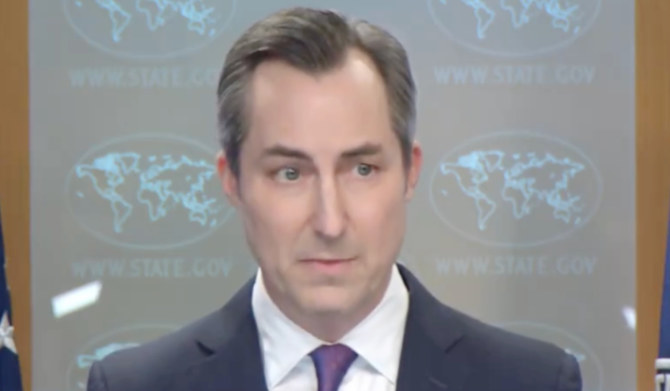
- Miller said the United States had received a report by former French Foreign Minister Catherine Colonna into the UN aid agency for Palestinians, UNRWA, and is reviewing it
- Israel has killed 34,151 Palestinians, mostly women and children, according to the Hamas-run territory’s health ministry
WASHINGTON: Palestinian militant group Hamas has “moved the goal post” and changed its demands in the hostage negotiations with Israel mediated by Egypt and Qatar, State Department spokesperson Matthew Miller said on Monday.
Speaking at a daily press briefing, Miller said the United States would continue to push for an agreement that would see hostages taken on Oct. 7 released and a pause in fighting in Gaza.
Separately, Miller said the United States had received a report by former French Foreign Minister Catherine Colonna into the UN aid agency for Palestinians, UNRWA, and is reviewing it.
UK parliament passes Rwanda asylum law as Sunak vows flights will start in weeks
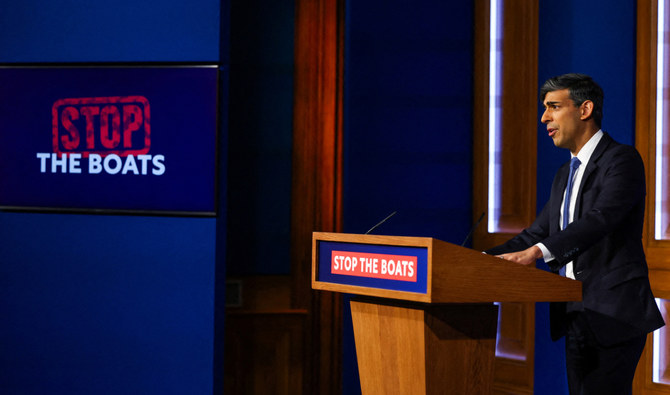
- Critics say the plan to deport people to Rwanda rather than handle asylum seekers at home is inhumane
- Other European countries, including Austria and Germany, are also looking at agreements to process asylum seekers abroad
LONDON: British Prime Minister Rishi Sunak promised on Monday to start sending asylum seekers to Rwanda within 10 to 12 weeks as the upper house of parliament finally passed required legislation, delayed for weeks by attempts to alter the plan.
Sunak said the government had booked commercial charter planes and trained staff to take migrants to Rwanda, a policy he hopes will boost his Conservative Party’s flagging fortunes before an election later this year.
The House of Lords had long refused to back the divisive legislation without additional safeguards, but eventually relented after Sunak said the government would force parliament to sit as late into Monday night as necessary to get it passed.
“No ifs, no buts. These flights are going to Rwanda,” Sunak told a news conference earlier on Monday.
Tens of thousands of migrants — many fleeing wars and poverty in Africa, the Middle East and Asia — have reached Britain in recent years by crossing the English Channel in small boats on risky journeys organized by people-smuggling gangs.
Stopping the flow is a priority for the government, but critics say the plan to deport people to Rwanda rather than handle asylum seekers at home is inhumane. They cite concerns about the East African country’s own human rights record and the risk asylum seekers may be sent back to countries where they face danger.
Sunak’s new law states some existing UK human rights statutes will not apply to the scheme and Rwanda must be treated by British judges as a safe destination, in a bid to override a Supreme Court ruling which declared the scheme unlawful.
It also limits individuals’ options for an appeal to only exceptional cases.
Other European countries, including Austria and Germany, are also looking at agreements to process asylum seekers abroad.
The legislation returned on Monday to the House of Commons — the elected lower house — where lawmakers removed changes proposed by the Lords before the upper chamber considered it again.
Some Labour and unaffiliated peers wanted the legislation to include safeguards for Afghans who previously helped British troops and to establish a committee to monitor asylum seekers’ safety in Rwanda. But eventually the Lords let the legislation pass its final parliamentary step without any formal changes.
The legislation is expected to receive Royal Assent from King Charles later this week, and then will become law.
Speaking before the legislation was passed, Sunak said an airfield was on standby, slots were booked for flights and 500 staff were ready to escort migrants “all the way to Rwanda.”
Under the policy formulated two years ago, and agreed with Rwanda, any asylum seeker who arrives illegally in Britain will be sent to Rwanda under a scheme the government says will deter Channel crossings and smash the people smugglers’ business model.
Sunak’s team hope the pre-election pledge will help turn around his electoral fortunes, particularly among wavering Conservative voters who want to see less immigration.
He had previously said he hoped the policy would be operational by spring, without giving a precise date.
Polls suggest his Conservative Party will be badly beaten in this year’s election by Labour, which has said it will scrap the scheme if it wins power. Labour says it will pursue a deal with the European Union to return some arrivals to mainland Europe.
Even after successfully navigating parliamentary hurdles, Sunak may still face legal challenges to the law.
Charities and rights groups say they would try to stop individual deportations and the trade union which represents border force staff is promising to argue the new legislation is unlawful “within days” of the first asylum seekers being informed they will be sent to Rwanda.
“We urgently need the UK government to start treating refugees with decency and stop trying to send them away to an unsafe future in Rwanda,” Lucy Gregg, acting head of Advocacy at Freedom from Torture, said in a statement.




